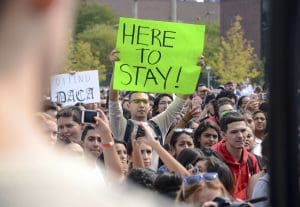How 2 new Supreme Court rulings will help LGBTQ immigrants
The Supreme Court ruled on workplace equality and an administration move against DACA.

LGBTQ undocumented immigrants had two U.S. Supreme Court victories to celebrate last week: one that clarified protections against anti-LGBTQ discrimination in the workplace, and a second that, for the time being, blocked the termination of an Obama-era program that benefits undocumented immigrants brought into the country as children.
On Monday, the nation’s highest court ruled in Bostock v. Clayton County that the prohibition in Title VII of the Civil Rights Act of 1964 of employment discrimination based on sex applies to discrimination against LGBT people.
The ruling stated: “A statutory violation occurs if an employer intentionally relies in part on an individual employee’s sex when deciding to discharge the employee. Because discrimination on the basis of homosexuality or transgender status requires an employer to intentionally treat individual employees differently because of their sex, an employer who intentionally penalizes an employee for being homosexual or transgender also violates Title VII.”
The decision has has larger implications for nondiscrimination protections beyond the workplace, in housing, education, and health care. LGBTQ groups that are already suing the Trump administration to stop the elimination of protections for LGBTQ people in health care say the Supreme Court decision in Bostock bolsters their case.
In the second case, the U.S. Supreme Court ruled in Department of Homeland Security v. Regents of the University of California against the Department of Homeland Security’s attempt to rescind the Deferred Action for Childhood Arrivals program, which provides protections for undocumented immigrants who were brought to the United States as children. Under the program, recipients are granted renewable two-year periods of deferred action on deportation and are eligible to receive a work permit.
The court’s decision on the DACA program was based on procedural issues. U.S. Chief Justice John Roberts wrote for the court: “We do not decide whether DACA or its rescission are sound policies. … We address only whether the agency complied with the procedural requirement that it provide a reasoned explanation for its action.”
In ruling that Homeland Security did not comply with the requirement, the court left open the opportunity for the administration to make future attempts to rescind the program.
Undocumented LGBTQ immigrants are concerned about what it would mean for their families and their well-being to be deported. Tony Choi, a gay DACA recipient who came to the United States from South Korea when he was 9, told Vox he doesn’t want to live somewhere without marriage equality and protections for LGBTQ workers.
Yesenia Chavez, an immigrants’ rights policy analyst for the American Civil Liberties Union, said the Supreme Court decisions have major ramifications for the 700,000 immigrants DACA shields from deportation. An estimated 67,000 of those 700,000 are LGBTQ.
“Queer immigrants, especially transgender immigrants, are pushed into the shadows not only due to their immigration status, but because until Monday, they weren’t sure of their workplace protections due to their LGBTQ identity,” Chavez said.
Chavez said the rulings put the law on the side of many LGBTQ immigrants as they look for employment without “constant fear of deportation.” And although the ruling on workplace equality will not automatically provide a welcoming work environment for LGBTQ immigrants, it is a much needed protection for these workers.
“While the ruling on Aimee Stephens’ case does not provide the cultural competency that it will take for all queer and trans folks to feel safe being out in the workplace, it’s a start,” Chavez said.
“It’s also critical to point out that while today’s DACA SCOTUS ruling provides immigrant youth some much-needed relief, it is a temporary victory because the Trump administration may continue to fight DACA, and we need to continue to push for a permanent solution to ensure Dreamers are protected and never have to be concerned about being separated from their families again.”
It costs nearly $500 for to renew DACA status. Some nonprofits raise money to help people to apply for the program.
Chavez said the administration needs to begin immediately accepting DACA renewals and new applications and restore the program to provide protections immediately for the thousands of people who could benefit from it.
On Sunday, acting Homeland Security Secretary Chad Wolf said that the administration still plans to end DACA, which he called “an unlawful program.”
Other policies are needed to protect the safety and well-being of undocumented immigrants in the United States. The ACLU’s Chavez said that despite the ruling, for example, many people at the intersection of multiple marginalized communities, including LGBTQ undocumented immigrants, will continue to be criminalized for sex work.
Chavez said that until sex work is decriminalized, those who do such work will be put in dangerous situations, which, in turn, “can land them into the criminal justice system, and further put them in a deportation pipeline.”
Published with permission of The American Independent Foundation.
Recommended

Alaska House committee advances, expands proposal to bar trans girls from girls sports
Amended bill would add elementary, middle school and collegiate sports to limits in place for high school
By Claire Stremple, Alaska Beacon - April 16, 2024
Bills targeting trans people are on the rise nationwide and in Alaska — most focus on children
House committee advances legislation that would restrict the rights of Alaska trans kids
By Claire Stremple, Alaska Beacon - April 01, 2024
Anti-abortion, anti-LGBTQ resolutions to be voted on at state Republican convention
A resolution to be considered by North Dakota Republican Party delegates at their upcoming convention would define life as beginning at fertilization and call for criminal penalties for “anyone who kills a pre-born human being.”
By Michael Achterling, North Dakota Monitor - March 26, 2024










































































